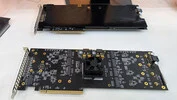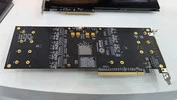Key Takeaways
1. PCIe 5.0 offers transfer speeds over 14 GB/s, while PCIe 6.0 and 7.0 are expected to reach 28 GB/s and 56 GB/s, respectively.
2. A demonstration at Computex showed 32 PCIe 5.0 SSDs in RAID 0 achieving speeds comparable to PCIe 7.0 X8, with sequential speeds of 113.6 GB/s.
3. The AMD Ryzen Threadripper Pro 7985WX system used for the demo utilized three PCIe 5.0 slots to enhance transfer speeds.
4. Phison’s PS5028-E28 Gen5 SSDs are rated for maximum read speeds of 14.8 GB/s and write speeds of 14 GB/s, with support for 3,000K IOPS.
5. Current Windows 11 kernel limitations may restrict speeds, suggesting potential for higher transfer rates with future software updates.
PCIe 5.0 is currently the quickest expansion bus standard for mainstream SSDs, boasting transfer speeds that exceed 14 GB/s. Each new PCIe generation typically doubles the maximum theoretical speeds of its predecessor. Therefore, the anticipated PCIe 6.0 standard should enable transfer speeds of nearly 28 GB/s over 4 lanes, while PCIe 7.0 could potentially reach around 56 GB/s on the same 4 lanes. However, users don’t have to wait for future PCIe versions to enjoy speeds that go well beyond the theoretical limits of PCIe 5.0. At this year’s Computex event, Phison partnered with Apex Storage to showcase a solution that links up to 32 PCIe 5.0 SSDs in RAID 0, achieving speeds comparable to PCIe 7.0 X8 and even higher.
AMD-Powered Demonstration
For their showcase at Computex, Phison utilized an AMD-driven system featuring an AMD Ryzen Threadripper Pro 7985WX installed on an Asus Pro WS WRX90E-SAGE SE motherboard, which offers a total of 7 PCIe 5.0 slots. They only needed three of those slots to create a RAID matrix that included 32 SSDs distributed across three Apex cards.
Although it was possible to use just two cards for a 32 SSD matrix, spreading the SSDs across three cards seems to have enhanced the transfer speeds even more. The sequential speeds hit an impressive 113.6 GB/s, while sequential write speeds were slightly lower at 104.6 GB/s according to CrystalDiskMark 8.0.6. This version of the well-known SSD benchmark also features a Mix test that combines 70% read speeds with 30% write speeds, where the Phison matrix achieved a remarkable transfer rate of 146 GB/s.
Phison’s New SSDs
The matrix of 32 SSDs consists of Phison’s latest PS5028-E28 Gen5 individual units. These units are manufactured on TSMC’s N6 fabrication nodes and are rated for maximum read speeds of 14.8 GB/s, while write speeds can reach up to 14 GB/s. They also support random transfers of up to 3,000K IOPS.
Phison noted that the existing Windows 11 kernel used during the tests is restricting speeds, indicating that there is potential for even quicker transfer rates with enhancements to the operating system code. Additionally, the PM584 microchip switch with 84 lanes that powers each Apex card is currently limited to 128 TB per matrix. This means the setup could accommodate either 32 x 4 TB SSDs across two cards or 16 x 8 TB SSDs on a single card.
Source:
Link






Leave a Reply